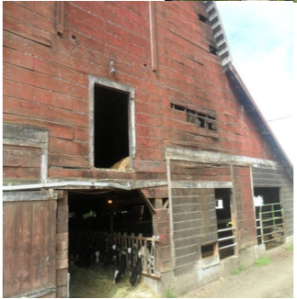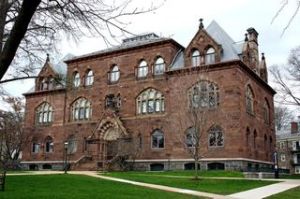“Farminary”
Rev. Jeremy Watson
12/29/13
A couple of weeks ago I saw a conversation between 2 of my seminary friends on social media. One of them serves a church in a rural community and has begun raising sheep and pigs, as a hobby, and wrote a book about it. My other friend is now a seminary Professor, a brilliant academic and a fantastic preacher. When he heard about the book he shared a vision that he and a friend are working toward, starting a “farminary” where his job would consist of preaching, beer, and cheese. I assume it would be making beer and cheese, not just consuming. Either way it sounds like a very cool job. That word “farminary” stuck in my mind ever since then, and eventually it started to make me kind of mad. And then I wondered why it made me mad.
As it turns out, “farminary” has become my Advent and Christmas lesson for this year. I grew up on a farm, a single-family dairy farm (pictured here) and later I spent 3 years at Princeton Theological Seminary. And I tried to imagine how those two worlds could ever fit together. I thought back to what it was like, attending school at Princeton, studying in beautiful buildings that were almost 200 years old, massive, stately, well-maintained, and full of the latest technology.
The lawns and the landscaping are always manicured. Many of the professors and administration live in a long row of beautiful million-dollar homes on Mercer St., they travel all over the world teaching and studying. The Library was built by and named after Henry Luce, the founder of the Time Magazine empire. Trustees and donors visit often, and they are well-connected people with power and influence, and probably old money, the kind of money and resources that built the institution and the endowment that keeps it going. When I think of seminary, I imagine that comfortable, prestigious, well-respected place, clearly connected to power and influence.
My experience of farming was the opposite, in almost every way. When I think of working on the farm as a kid, it was not comfortable, prestigious, or well-respected. I remember getting on the school bus as the other kids plugged their noses at the smell of the cow manure, and said mean things. I remember worrying that I hadn’t scrubbed my hands well enough between morning chores and going to school and that my classmates could smell the farm on me. I remember the constant reminders that we had less privilege than others, even though I was pretty sure we worked harder than anyone that I knew. I won’t ever forget feeling powerless, coming to understand that corporate farms were squeezing out single-family farms like ours, sacrificing quality for volume, utilizing market control, and as far as I knew, we were powerless to do anything about it.
My experiences of farming and seminary are a striking juxtaposition in that way. And I think it made me mad because my friend, in his innocent comment, has no understanding of farming as I experienced it. He’s talking about “hobby-farming.” Those of us who have farmed for real, for survival scoff at hobby farmers. They don’t have the “pasture-cred” to talk about farming. I think it made me mad because I still have some of that inferiority complex, of coming from a place without power and influence, and then experiencing a place that reeks of power and influence.
It’s irrational to feel that way. I should be more thankful that Princeton Seminary uses those resources to give financial aid to people like me, so that we all can benefit from those resources, and then serve and love and seek justice in a broken world. That power and influence and those resources are used for good. And I become more convinced with each passing year that my experiences on the farm were valuable in ways much deeper than money or privilege. Working hard, running a business together as a family, being connected to the earth, everything that my Dad called “character development”, those are deeply valuable experiences that I want for my own children.
Even so, I found myself angry and still holding on to old bitterness, without that perspective. There is something about that inferiority complex that remains buried, deeply within.
I have also been reading through a book about Jesus’ life, called Zealot, by Reza Aslan. And one thing that Aslan does exceedingly well, is explore what it meant for Jesus to live as a Nazarean under Roman occupation. I had never understood the depth of what Jesus’ life was like, growing up, living, and working in Nazareth.
To make a complex story short, the Romans were very savvy in how they controlled their occupied territories. The ruling class of a people, like Herod the Great for example, (who we just heard about in the Scripture reading) were allowed to do whatever they wanted, with Roman power backing them, so long as they kept the taxes coming and relative order in their region. Exorbitant taxes, land grabs, predatory lending, violence against revolt, all were commonplace. The ruling class was able to become wealthy off the backs of common people, in small villages like Nazareth. Jesus grew up in a village of powerless, oppressed people living under the thumb of Rome and Herod Antipas, the son of Herod the Great. The Nazareans scratched a living out of the land that they no longer even owned.
We are told that Jesus was a carpenter, or a construction worker. There was not a construction industry in a place like Nazareth, so the most reasonable explanation for what Jesus did is conscripted labor. Jesus almost surely spent his working years building the city of Sepphoris for Herod Antipas and his cronies. It was the only notable construction project in the region, and it was a gleaming city full of palatial estates, built by peasant laborers for the wealthy who oppressed them. I can only imagine what it must have been like for Jesus and his fellow Nazareans to be powerless and oppressed.
And that makes Jesus all the more remarkable. To understand the peasant upbringing that Jesus came from . . . shows how deeply powerful Jesus was. As we celebrate Christmastide for these 2 weeks . . . as we experience the darkest days of the year slowly getting longer . . . as we recognizing light overcoming darkness, it is helpful to understand the extent of the darkness. Jesus entered a broken world in a powerless peasant family in a poor village in a territory occupied by the most powerful empire on earth. And from that place, Jesus chose to love the world. Jesus chose to save the world.
Christmastide and the Advent of a New Year is a great time to take stock of our lives. Every one of us has our own struggles, our own complexes, things that we have struggled to overcome, or that we’ve buried deep within ourselves. The author Wendy Mass says it well, “Be kind, for everyone you meet is facing a battle you know nothing about.”[i] Every one of us has been blessed, in more ways than we can count, probably in ways that we don’t fully understand. As we recognize the struggles and the blessings that make up each of our lives, may we be renewed and empowered to follow the example of Jesus. May we join with Jesus in bringing light to the darkness!
[i] The Candymakers (quote posted on Facebook)


Reverend Watson,
I expect you know about this new course, but if not, I hope it pleases you and affirms your theme. The class is limited to 15; I got in from senior[ity]. I registered at 8:06 — one minute after the site went live at 8:05 — and I was the 12th person.
EF4390 Scripture and Food: Teaching the Bible in the Congregation will serve as a pilot course at PTS’s 21-acre farm. All regular class sessions will take place at the farm. As the seminary continues to explore the possibilities for integrating theological education with matters of agrarianism, ecology, and sustainability, this course will provide students with the opportunity to acquire knowledge and experience that can only be gained by way of the integration of rigorous work that is both intellectual and physical. In order for the course to follow seasonal weather patterns, it will meet for two hours the first week of spring classes for orientation, and then will not meet again until after reading week. The six-hour weekly time block (post-reading week) is tentatively set to include working and tending the inaugural PTS farminary garden, a potluck, and more traditional classroom-style learning (in a shed). This course has a limited enrollment of 15 students. If full, you may get on a wait list by emailing registrar@ptsem.edu. This will help the instructor assess possible need for course expansion. It will also help PTS assess interest in this course, farminary, and related fields. Course meets at the Seminary’s Farminary on Thursdays, March 19 to April 23, 3:00-9:00pm. Orientation class will meet on Thursday, January 29, 2014 – 3:00-4:50pm.
Dana,
I hadn’t heard about that class. Thanks for letting me know. I would’ve loved the opportunity when I was there and am looking forward to hearing more about it. thanks!
I can imagine how annoying hobby farming can be from your perspective… Although having a garden is enormously helpful in the ministry.
When I served a small rural church with very little money, a pastor recommended we start a garden. Now we have a couple of them. One my husband tends at a church in the projects and one in our yard. Though we don’t subsist on them alone, for years we have used them to lower our grocery bills and get by in lean summer months. And we are incredibly grateful for the local, single family farmers who provide incredible support in all of this.
Thanks, Carol. The annoyance of hobby farming is my own issue to work through. It is worth recognizing how those who farm are often seen as second-class citizens, and are increasingly low-paid migrant workers. But I don’t want to dissuade anyone from “hobby-farming” and think it’s very important for all who can to engage in growing their own food.